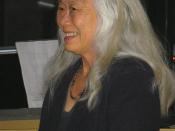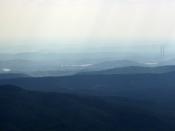"'You must not tell anyone... what I am going to tell you.'" (3) Is this not an ironic beginning for a memoir? When in fact, Maxine Hong Kingston, the author and narrator of The Woman Warrior, is doing the exact opposite, and telling everyone. The use of voice in her memoirs is not present merely on a literal level, but also a figurative. The entire book is a means of expression through a voice which cannot be found within Kingston; a way to say that which cannot be said. From the first page to the last chapter, Kingston describes her struggle to find a voice in a foreign land which she has lived in her entire life.
The land she lived in was made distant by her mother's talk-stories, which draw on both Chinese myths and life. There is at least one talk-story in each chapter. Most are told by Brave Orchid to Kingston when she was a young girl.
The memoirs also begin and end with an important talk-story. Brave Orchid, Kingston's mother, used her words to the maximum effect, often to teach a life lesson or tell of a Chinese tradition. Certain talk-stories, however, were told to make Kingston act a certain way. Because of this, Kingston was both liberated and smothered by her mother's stories. This was the case in No-Name Woman, a chapter dedicated to secrets and forgotten pasts. A talk story is told about a woman; she was Kingston's aunt who killed herself after giving birth to a baby born out of wedlock. The social order of the town was disrupted, so the townspeople attacked the woman's house, forcing her to give birth in a pigsty. When she was found plugging up a well the next morning, it was agreed that she would...


